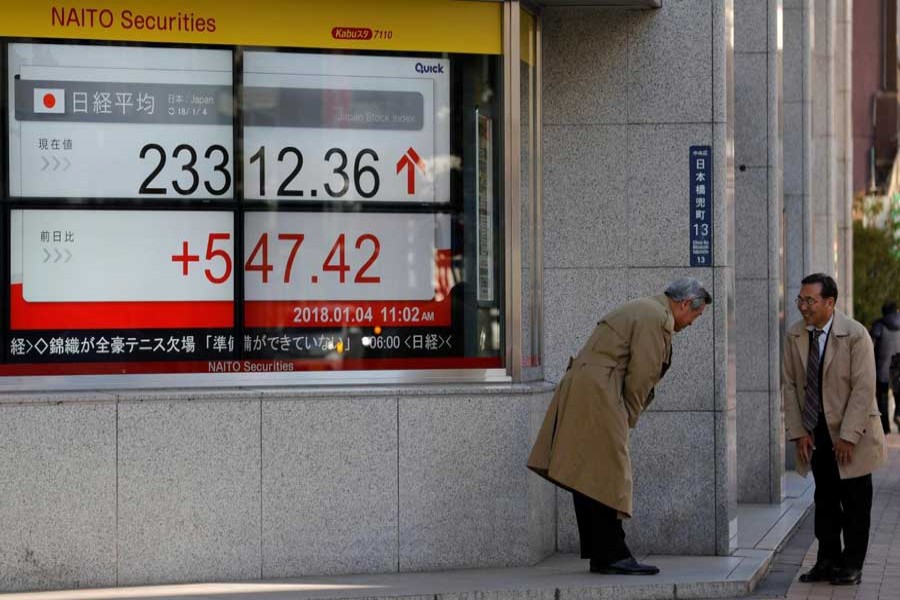China’s stock markets slumped on Wednesday, extending a rout from the previous day as the prospect of a full-blown Sino-US trade war put a dampener on the rest of Asian equities, even as they managed a modest bounce.
MSCI's broadest index of Asia-Pacific shares outside Japan .MIAPJ0000PUS, rose 0.4 per cent, though that came after a 2.1 per cent fall on Tuesday. Japan's Nikkei .N225 was up 0.1 per cent after earlier falling into negative territory. South Korea's KOSPI .KS11 rose 1.0 per cent.
In China, the Shanghai Composite Index .SSEC dropped 0.6 per cent in choppy trade, a day after falling 3.8 per cent to a two-year low. Wednesday's fall came despite 30 listed firms announcing share purchase plans by major shareholders, and state media expressing confidence in the country's stock markets.
China's blue-chip CSI300 index .CSI300 was 0.5 per cent lower after briefly flirting with gains, and the Shenzhen Composite Index .SZSC was flat at midday.
The extended sell-off in China comes despite indications that the country’s central bank could move to cut banks’ reserve requirement ratios (RRR) to boost market liquidity, highlighting concerns over trade. The People’s Bank of China (PBOC) recommended the move in working paper on Tuesday.
“It is fair to say an RRR (cut) seems imminent ... the only question is the magnitude,” Sue Trinh, head of Asia FX Strategy at RBC Capital Markets in Hong Kong said in a note.
An apparent bias toward looser policy “runs counter to the regional bias toward higher rates to protect currency downside,” she said, adding that growing policy divergence indicates room for the onshore and offshore yuan to depreciate.
Trade tensions between the United States and China showed few signs of easing after a White House trade adviser said on Tuesday that Beijing has underestimated the US president’s resolve to impose more tariffs.
Washington threatened on Monday to impose a 10 per cent tariff on $200 billion of Chinese goods after Beijing decided to raise tariffs on $50 billion in US goods, in response to similar tariffs on Chinese goods announced Friday.
Weakening appetite for risk pushed the yield on benchmark 10-year Treasury notes US10YT=RR lower to 2.8894 per cent, after earlier rising to 2.9 per cent.
The two-year yield US2YT=RR, which rises with traders’ expectations of higher Fed fund rates, was at 2.5451 per cent after earlier touching 2.5530 per cent.
S&P 500 futures ESc1 were flat, suggesting a limited upside for Wall Street after major US indexes closed lower Tuesday.
Australia catch-up rally
In contrast, Australian stocks gained 0.8 per cent, supported by a weak local dollar AUD=, which rose 0.2 per cent after hitting a one-year low on Tuesday.
A more attractive dividend proposition and a weaker Australian dollar have made the market more alluring to overseas investors, said Ryan Felsman, a senior economist at CommSec.
“Last year the Aussie market was only up 7 percent relative to the US at 25 percent. We didn’t get the sugar hit from the corporate tax plan, so there’s a bit of catch-up in play as well,” he said.
The US dollar was mostly flat against the yen, rising 0.05 per cent against 110.10 JPY=, still some distance from its high this year of 113.38 on January 8.
The euro EUR= was down a hair at $1.1581, while the dollar index .DXY, which tracks the greenback against a basket of six major rivals, was barely lower at 95.040.
US crude CLc1 rose 0.4 per cent to $65.31 a barrel. But ANZ analysts said in a note that rising trade tensions and disagreement within the Organization of the Petroleum Exporting Countries, which meets on Friday, are likely to weigh on oil prices.
Iran said on Tuesday that OPEC was unlikely to reach a deal on oil output this week.
Gold was mostly flat after falling near six-month lows Tuesday on a strong dollar. Spot gold XAU= was traded at $1274.50 per ounce.
Investors in cryptocurrencies were also hit by losses after South Korean virtual currency exchange Bithumb said it had been hacked and 35 billion won worth of virtual currency held at the exchange was stolen.
Bitcoin BTC=BTSP was 1.8 per cent lower at $6,615.46.


